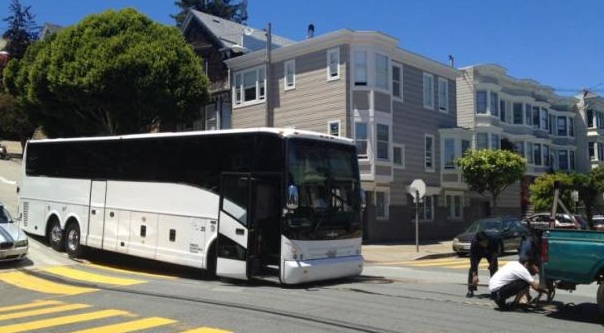
There’s often talk of public transportation. And I get the idea; the more accessible work, shopping and other services are to folks who might be struggling, the better off those folks might be. A second argument surrounds the environment. The more people use mass transit, the better off we are in terms of gas use, pollution and, recently, CO2 emissions.
Not to mention the fact that traffic just sucks and anything that we can do to minimize it is a plus.
All arguments aside, suppose, for the same of this discussion, that I cede all points. That mass transit is the way to go, my question is this:
Does it matter what agency provides that transit?
The answer is:
Apparently so.
By now you’ve heard about the perks that come with working in Silicon Valley. Free lunch, 20 percent time — that’s the work time you can use to pursue independent projects.
Well, another perk? A private bus that picks you up in your neighborhood in San Francisco and shuttles you down to your corporate campus about an hour south in the suburbs of Silicon Valley.
During rush hour in San Francisco, you see them everywhere, said Eric Rodenbeck, the creative director of Stamen Design in the Mission District of San Francisco.
“They’re just so big,” Rodenbeck says. “These buses are two stories high and they’re barrelling down residential streets, and no one knows where they’re going except the people who are on them.”
So now the complaint against “Big Business” is that they bus people to work. It’s almost like if the government isn’t providing it for you, it’s just this great big secret conspiracy or something:
“You know it’s almost like this masonic ritual,” Rodenbeck says. “If you’ve got the key, this whole other city layer unlocks itself to you. And that’s the kind of urban puzzle we like to solve.”
I mean, serious.
So what we have are private companies shelling out their own money to transport people from where they live to where they work. All this to reduce traffic, reduce emissions, pollution and dependence on oil and other fossil fuels and it STILL isn’t good enough:
Rodenbeck says he thinks the locations are secret because the companies are “sensitive to this idea that they are funding a change in the infrastructure in San Francisco without it being regulated.”
The San Francisco Municipal Transportation Agency is in the midst of studying what’s essentially emerging as a private mass-transportation system, says Jerry Robbins, a transportation planner for the agency.
“The increase in employer buses has sparked some reaction from residents,” Robbins says.
He says that since tech companies contract out the work to private bus companies, which are regulated by the state, the city has little say in what they do.
But Robbins says the agency has fielded complaints that the the private shuttle buses, which often stop at public bus stops, are causing delays and traffic.
Again, private companies are providing transportation, almost exactly like that being provided by the government, but residents don’t like it because it’s not regulated.
But how many folks does this private system haul everyday?
When the map was finished, Stamen counted busses from Apple, eBay, Electronic Arts, Facebook, Google and Yahoo, and they found the buses ran through almost every neighborhood in San Francisco. Stamen estimates that about 14,000 people ride the private shuttle buses every day.
Fourteen Thousand. People. Everyday. In government speak that is 28,000 trips. Everyday. For free. And how does the private sector seduce such riders?
“It’s pretty sweet,” Birch said. “They let us choose the type of seats and decor inside. And it’s got dim lighting with the Google colors.”
There’s also free Wi-Fi on the shuttles, and Birch said it’s basically another hour of work.
The tech world is driven by young, educated largely urban workers. But companies like Facebook, Google and Apple are located in the suburbs of Silicon Valley, which is about an hour south of the San Francisco.
“I think a lot of young people who work at the tech companies they want the city life they want something that’s fun and entertaining, and you don’t get that in the suburbs,” Birch said.
Yeah. By offering what people want.
Look, I like buses more than I like cars. And I like trains more than I like buses. And I like lite rail more than I like trains. But more than any of that I like solutions that actually work. So maybe the public sector should take some clues from the private sector and begin to work to loosen the grip of public transportation and let it move into the private space.
You might just get free WiFi.








